- Home
- Robert Muchamore
Scorched Earth Page 4
Scorched Earth Read online
Page 4
‘Five seconds.’
‘Wait,’ Jean shouted, emerging through smoke, bare-chested and with his hands raised.
PT and Rosie made a crouching sprint along the wall with their heads down. The scene in front of the orphanage was horrific, with boys ranging from three to thirteen in hysterics while a nun bled out on the front steps. Another nun was on her knees, praying quietly with Commander Robert’s gun at her temple. As Jean got closer, the moustached Milice commander handed his megaphone to a colleague and broke into a smile.
‘Well, well, I have a prize,’ Robert said, cracking a self-satisfied smile as he took his gun away from the elderly nun’s head and sent her sprawling with a muddy boot in the back.
‘Where are the other two from the robbery?’ Robert asked, as Jean stepped to within a few metres.
‘I was injured,’ Jean said, turning to show his bloody shoulder. ‘They brought me to the cottage to get fixed up, but they didn’t stick around.’
A giant Milice officer ordered the balding ex-teacher to kneel, before unhooking a set of handcuffs from his belt. Down by the road, PT knifed the front tyres of the nearest Milice car, before joining Rosie by a crack in the wall.
‘You holding up OK?’ PT asked.
‘Not exactly the fresh air I was after,’ Rosie said, as a breeze blew smoke into her eyes. ‘I can only count four Milice, but there could be more inside the orphanage or in the woods.’
‘They’ve caught a big fish and Robert looks twitchy,’ PT said. ‘He’s four men down and this is Maquis turf. They’re not gonna want to stick around here a second longer than they have to.’
PT’s opinion got confirmed as the nuns were allowed to begin shepherding hysterical kids inside the orphanage. Commander Robert’s fear of a Maquis ambush was obvious as he began jogging downhill towards the open-topped Milice car parked across the orphanage gate.
PT would have liked to stab the tyres, but the gate was open so there was no way to approach without being seen and shooting would give their position away.
‘When the giant one gets close I’ll shoot him,’ PT whispered to Rosie. ‘Jean’s cuffed, but he can still make a run for it. You’ll have to be ready to take the others out with the machine gun.’
‘Sounds like a plan,’ Rosie said, as she double-checked that her unfamiliar German machine gun had the safety off and a full clip of ammo. Then she gave PT a quick peck on the cheek. ‘Be careful.’
Before PT could react, he noticed Jean’s giant guard losing his footing on the damp ground. It was too good a chance to miss and PT took aim as the Milice’s butt hit the soft turf. But another voice sounded behind before he could shoot.
‘Drop your weapons.’
When PT spun around he saw a tiny Milice officer standing behind the car with the slashed tyres. Rosie didn’t hesitate with the machine gun and ripped the man in half. The blast sent Jean’s guard diving for cover, while Jean himself began sprinting towards the wall.
PT leaned over the wall and took two shots, but he only hit the giant in the thigh. At the same moment Rosie opened up on Commander Robert and his two goons as they began a full-on sprint towards the car.
The giant got a couple of wild shots into the air with his rifle and forced PT to duck behind the wall, but Jean had doubled back. The balding ex-teacher jumped on top of the giant and used his cuffed hands to ram home a small dagger that he kept concealed inside his boot.
Down by the gate, Commander Robert braved machine-gun bullets as he jumped into the back of the open-topped car without bothering to open a door. As his two colleagues scrambled in the front and started the engine, Robert dived flat across the back seat.
The crying kids were all back inside the orphanage as Jean rolled off the giant, leaving his dagger sticking out of his neck, and the car began moving.
‘Christ,’ Jean gasped, keeping low as he searched the giant’s pockets for handcuff keys.
‘We need to keep an eye out,’ PT said, as he stood up and glanced around. ‘That commander looked so scared, I wouldn’t be surprised if he’d left a man behind.’
Down by the gate, Rosie took aim at the retreating car, but only got an empty click from her machine gun. It would be out of range before she could reload, so she decided to take cover by scrambling over the wall. As she prepared to vault, Commander Robert sat up in the back seat and took two quick pistol shots.
One bullet skimmed PT’s arm, close enough for its vortex to ruffle his shirt sleeve. He dived clumsily into weeds growing close to the wall and grazed his knuckles on bricks as the bullet tore up a bush metres behind.
‘Too bloody close,’ PT gasped, assuming Jean was within earshot. ‘That commander’s either a very lucky shot, or a very good shot.’
PT didn’t want to move until the Milice car was out of sight, but he could hear Jean running on the other side of the wall.
‘Rosie!’ Jean shouted.
Down by the gate, Rosie lay on her back with her legs sprawled. PT began a sprint towards her as Jean ran through the gate, doubled back and got down on one knee in front of Rosie.
‘Is she OK?’ PT shouted.
When PT got close enough to see the blood he felt like he’d been smashed across the back of the head with a brick. Commander Robert’s pistol shot had hit the base of Rosie’s nose as she’d straddled the wall. The bullet had splintered inside her brain and torn a great chunk out of the back of her skull.
‘Rosie?’
Gravel and dirt spewed up as PT dived down on his knees in front of her. When he looked up, he saw Jean, with tear-filled eyes and the half-unlocked cuffs swinging off his right wrist.
‘You can’t be,’ PT gasped, tears welling as he snatched Rosie’s wrist and felt for a pulse where he knew there couldn’t possibly be one. ‘It can’t …’
PT felt like his chest was in a vice as his eyes fixed on Rosie’s glazed face and her blood trickling between chunks of gravel.
CHAPTER SIX
Reliable news on the successful tunnel blast reached Henderson just after 10 a.m., via a nineteen-year-old Maquis whose girlfriend worked inside the Beauvais telephone exchange.
Henderson and his squad had retreated from the logging camp, delving a full kilometre into woodland. With the tunnel blast and the raid on the admin building in town, there was a good chance of German retaliation, so he doubled up on lookouts and advised the eight other Maquis squads spread through the woods to do the same.
Henderson was a poor radio operator, so he relied on Edith and Sam for his daily Morse code communication with CHERUB campus. But Sam was out running messages and Edith had cooled off in a stream before taking a nap, so Henderson sat under a tree, grumpily encoding that afternoon’s radio transmission using a printed silk square known as a one-time pad.
These highly flammable squares had been devised by British cryptologists. They made encoding messages fairly easy, and once a tissue-thin square was burned – or torn up and swallowed if you got desperate – the message could only be decoded by a radio operator with a codebook containing an identical grid of printed letters.
‘Shit, shit, shit!’ Henderson muttered, as his fountain pen made a blotch that spoiled several letters on his squared paper.
Whenever Henderson blobbed ink, his mind always wandered back to the rap on the knuckles his schoolmaster had given him when he’d done it as a boy. This flashback to a life of inkwells and wooden desks was shattered by a barefoot teenager named Gilles. He wasn’t one of Henderson’s trained agents, but he was loyal and had been on several raids.
‘Couple of bodies seen walking up the hill,’ Gilles said. ‘Probably ours, but I thought you’d like to know.’
‘Thanks,’ Henderson said. ‘It’s possible one of our boys has been captured, so keep vigilant, even if they give the right password.’
Henderson smiled when Jean and PT reached him, but a quick read of their faces was enough to know something was seriously wrong.
PT rubbed a wet eye as he told the story
. Henderson had been extremely fond of Rosie and had a lump in his throat as he turned to Jean.
‘What’s with your shoulder?’ he asked.
‘The least of my worries,’ Jean said. ‘It’ll heal.’
‘Edith’s sleeping and no point waking her up for bad news,’ Henderson said. ‘There’s a chance Milice or army will return to the orphanage in force, either to interrogate the nuns or cause general mayhem.’
‘Agreed,’ Jean said.
‘Should we get the nuns to evacuate?’ PT asked.
Henderson thought for a couple of seconds before shaking his head. ‘The nuns won’t leave the orphans behind, and how would we feed and shelter over a hundred boys? All we can do is send a protection squad down there. I’ll make sure they’re led by someone with half a brain and if it comes to the worst, they’re not to try to stand their ground. Their job is to protect the orphanage for as long as it takes to safely evacuate the nuns and the children.’
‘I’ll lead the team,’ PT said. ‘Make sure the kids are ready to evacuate if necessary. Station lookouts on the road. Scout some hiding places and plan out a route so that the kids can be moved to safety at the first sign of trouble.’
In the four months they’d been with the Maquis, PT had proved himself capable. But Henderson wasn’t sure about putting him in charge right now.
‘Things got frosty after you broke up,’ Henderson said. ‘But I know Rosie was special to you.’
‘It’s kinda my fault,’ PT said. ‘She saved my life, killing a guy who popped up behind us. Then I missed two pistol shots from close range, so she had no back-up covering the commander’s car.’
Henderson stood up. ‘Don’t go there,’ he said firmly, as he placed one hand on PT’s shoulder. ‘Blame games just mess up your head. The only reason any of us are here is because there’s a war and the only reason there’s a war is because of the Nazis. So, hate Adolf Hitler, not yourself.’
As Henderson said this he let out a tiny sob and yanked PT into a tight hug.
‘Can’t believe she’s dead,’ PT said weakly.
‘I believe in you,’ Henderson said decisively. ‘Pick seven or eight of the best lads. Make sure they’ve got weapons, but stay mobile. Don’t weigh yourselves down with too much crap.’
‘Haven’t forgotten my training, sir,’ PT said, tapping his head to indicate that the knowledge was all inside.
As PT jogged off to gather a team to protect the orphanage, Henderson stared up into the sunlight over the trees then, after a pause, down at Jean.
‘I knew Rosie and Paul’s father,’ Henderson said, as he glanced at his wristwatch. ‘First saw her when she was knee high, playing in the gardens at the British Embassy in Paris. And now I’ve got to tell her brother that she’s gone.’
*
Luc, Paul, Michel and Daniel had walked out to the tunnel in darkness, but the 18-kilometre return trip was in daylight. Once they were 5 kilometres from the tunnel blast and sure nobody was following, they stopped off at a safe house that Luc had organised during his reconnaissance trip.
They washed in cold water and ate a late breakfast of biscuits, cheese and raw eggs. An hour’s rest seemed to pass in a flash and they left their guns behind before setting off with new sets of identity papers and a handcart laden with firewood.
As there was no coal ration for civilians in summertime there was nothing unusual about youngsters foraging for wood to cook with. The only checkpoint they encountered was staffed by a bored-looking French policeman. He gave the barest glance at their papers and cracked up laughing when he saw Daniel nestled in the wood pile, snoring his head off with his big brother’s shirt draped over his face to stop it getting sunburned.
‘He’s got a woman who keeps him up all night,’ Michel explained.
The friendly cop kept on laughing as they set off. Paul and Luc appreciated the joke too, but they were exhausted and the casualties on the passenger train muted any sense of triumph.
It was two in the afternoon when they reached countryside north-west of Beauvais, which some lads nicknamed the Badlands. The main threat here wasn’t from Germans or Milice, but from a thirty-strong band of Maquis bad boys, many of whom either didn’t like obeying Jean’s rules or had been kicked out for breaking them.
With no resistance contacts and no access to Allied supply drops, these young rebels were forced to steal and frequently made violent raids on farms, or held up shops. Many locals found it impossible to distinguish between different Maquis groups, and feared the gangs of young men living close by.
Luckily the quartet’s only problem was that they had to abandon the handcart when they left the road. Daniel moaned like hell when his pleas for a piggyback got turned down and he had to walk the last couple of kilometres.
News of Rosie’s death had spread through the young men stationed in the woods when PT had gone round picking his team to defend the orphanage. But if anyone acted strangely around Paul, he was too exhausted to notice.
By the time Henderson caught up, Paul had stripped off his boots and trousers and taken shelter from the sun under a canopy of woven branches. He now lay fast asleep on top of a sleeping bag, bony ribcage rising and falling with each breath.
Luc was officially in charge of the tunnel mission. He admired Henderson, but they rubbed each other up the wrong way and Luc spoke formally. ‘Would you like a briefing, sir?’
Henderson waved his hand dismissively. ‘You blew the train up and blocked the tunnel. Word from our sources in Beauvais is that the line will be out of action for two weeks. Perhaps more, if the fire buckled the iron trusses holding up the tunnel.’
‘Shame about the passenger train,’ Luc said coldly.
‘It’s a busy line,’ Henderson said. ‘There was always that risk. You did an excellent job. Now try catching some sleep and make sure Paul speaks to me as soon as he wakes up.’
Luc saw the hurt on Henderson’s face and could only think of one reason. ‘Is Rosie OK?’
Henderson almost said it, but it seemed wrong that Luc should find out first and he sounded annoyed. ‘Just do as I say for once.’
CHAPTER SEVEN
A Maquis might spend a few hours a day hunting, fishing, patrolling or collecting firewood. A couple of times per week there might be some extra excitement, like moving camp, a trip into town with a fake ration card or being picked for one of Henderson’s sabotage operations. But that still left a typical Maquis with a lot of free time.
Cards, dice and boxing were common, but the number one pastime was spreading and discussing rumours. Only the participants and a couple of Henderson’s agents knew about the tunnel raid, but everyone knew about the raid on the admin building, and the carnage at the orphanage was a full-blown sensation.
Henderson had asked the Maquis to stay in the forest to minimise the chances of further trouble, but for hard-core rumour mongers this only spurred a widespread belief that the Milice were now out to get them. By the end of a hot afternoon, the main debate was whether the Milice would stage a revenge attack on the orphanage, or come charging into the forest itself, backed up by German tanks and artillery.
Henderson sat under a woven branch canopy as Gilles asked for his opinion.
‘Every day someone tells me we’re doomed,’ Henderson said. ‘If the Germans had the will and resources to flush us out of the woods, why wait until now?’
‘Other Maquis groups have been smashed,’ Gilles pointed out.
‘Mainly in the south and usually when they stopped being mobile,’ Henderson said. ‘Anything is possible, but don’t tie yourself in knots over rumours.’
‘What about the orphanage?’
Henderson was less comfortable on this subject. ‘They’re vulnerable because they can’t vanish into the woods like we do. In our favour, people aren’t exactly queuing out the doors of Milice recruitment offices.’
Gilles nodded. ‘Especially since the communist resistance began killing family members of Milice officers.’
/>
‘There’re many fewer men in Milice uniforms than the Germans would like us to think, that’s for sure,’ Henderson said.
Gilles was about to ask another question when Paul stepped into the shelter, dressed in a vest and ragged undershorts.
‘I’ll leave you to it,’ Gilles said. His mouth gaped and he put a clumsy foot in Henderson’s mess tin as he backed out.
‘My sister’s dead, isn’t she?’ Paul said.
‘Did Luc tell you?’ Henderson asked irritably. ‘I specifically asked—’
Paul interrupted and pointed back at Gilles. ‘Nobody told me, but everyone reacts like Gilles just did when they see me.’
‘You want to sit down and talk about it?’ Henderson said, standing up as he realised he had the only seat under the canopy.
Paul sounded eerily calm. ‘I don’t feel … I’ve seen so much shit in the last four years, I almost expected something like this.’
‘Shock,’ Henderson said.
Paul nodded, then Henderson took some time explaining what had happened at the orphanage.
‘Any time you want to talk, I’m here. I thought you might want a few days away from the woods. I’m sure you’d be welcome at Morel’s farm.’
‘Have they buried her?’
‘I told PT to wait,’ Henderson said. ‘Though it’s hot and she’s got an open wound, so she can’t stay above ground for too long.’
‘I know she’ll be a mess, but I’d like to see her one last time.’
‘You’re sure?’
Paul nodded.
‘OK,’ Henderson said. ‘I need to see how PT has set up his defences down at the orphanage. I’ll walk down there with you and we can pay our last respects.’
Paul’s feet were painful after a 36-kilometre round trip and his sweaty shirt had been taken away to be washed while he slept. By the time Gilles found a clean shirt, Paul had painfully pulled boots over his blisters.
Henderson was also ready to leave, but Edith and Sam came racing back from the hillside where they handled daily communications with CHERUB campus.

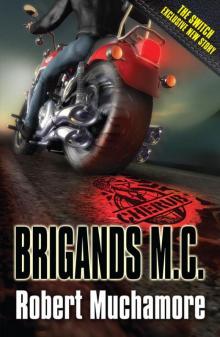 Brigands M.C.
Brigands M.C. Home
Home The General
The General New Guard
New Guard Lone Wolf
Lone Wolf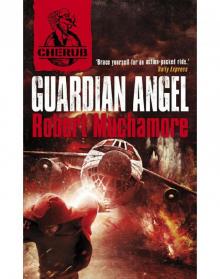 Cherub: Guardian Angel: Book 14
Cherub: Guardian Angel: Book 14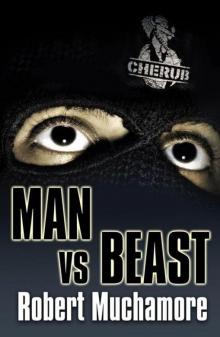 Man vs. Beast
Man vs. Beast The Escape
The Escape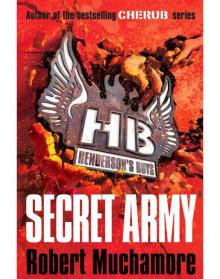 Secret Army
Secret Army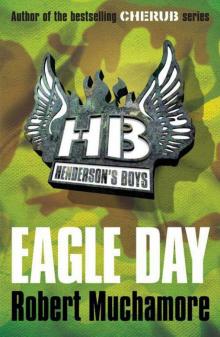 Henderson's Boys: Eagle Day: Book 2
Henderson's Boys: Eagle Day: Book 2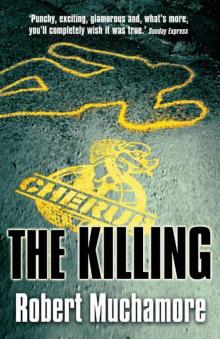 The Killing
The Killing Divine Madness
Divine Madness Class A
Class A The Sleepwalker
The Sleepwalker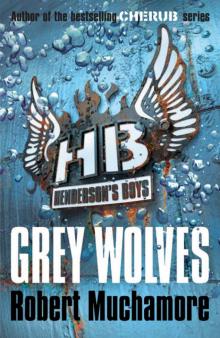 Henderson's Boys: Grey Wolves
Henderson's Boys: Grey Wolves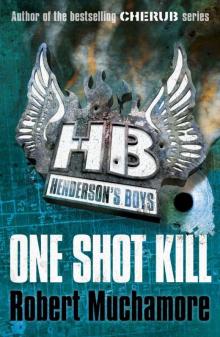 Henderson's Boys: One Shot Kill: One Shot Kill
Henderson's Boys: One Shot Kill: One Shot Kill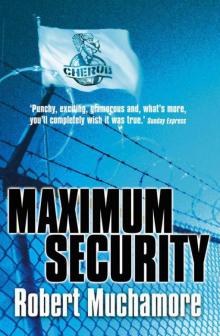 Maximum Security
Maximum Security The Prisoner
The Prisoner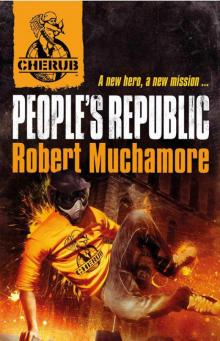 People's Republic
People's Republic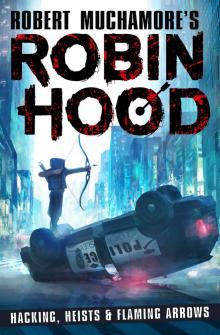 Robin Hood: Hacking, Heists and Flaming Arrows
Robin Hood: Hacking, Heists and Flaming Arrows Shadow Wave
Shadow Wave Mad Dogs
Mad Dogs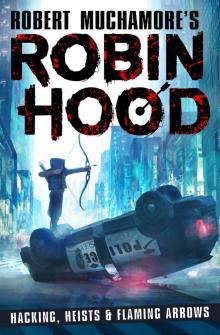 Robin Hood
Robin Hood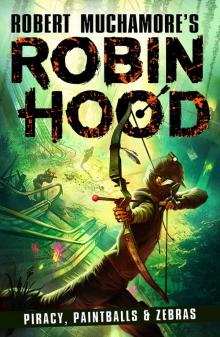 Robin Hood 2
Robin Hood 2 KILLER T
KILLER T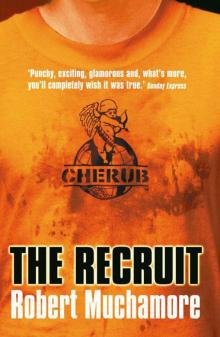 The Recruit
The Recruit Henderson's Boys: Scorched Earth
Henderson's Boys: Scorched Earth The Fall
The Fall Jet Skis, Swamps & Smugglers
Jet Skis, Swamps & Smugglers Black Friday
Black Friday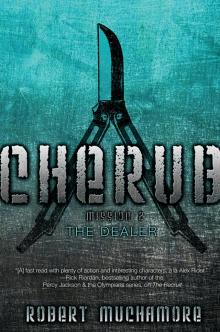 The Dealer
The Dealer CHERUB: Mad Dogs
CHERUB: Mad Dogs Scorched Earth
Scorched Earth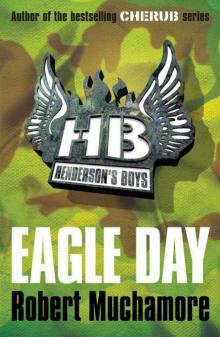 Henderson's Boys: Eagle Day
Henderson's Boys: Eagle Day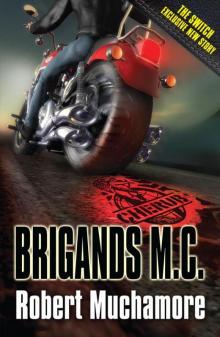 CHERUB: Brigands M.C.
CHERUB: Brigands M.C.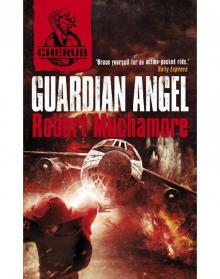 CHERUB: Guardian Angel
CHERUB: Guardian Angel CHERUB: The Sleepwalker
CHERUB: The Sleepwalker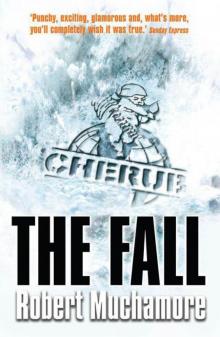 CHERUB: The Fall
CHERUB: The Fall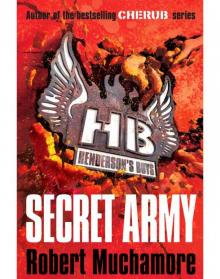 Henderson's Boys: Secret Army
Henderson's Boys: Secret Army CHERUB: Dark Sun
CHERUB: Dark Sun CHERUB: Divine Madness
CHERUB: Divine Madness CHERUB: The General
CHERUB: The General New Guard (CHERUB)
New Guard (CHERUB) CHERUB: Shadow Wave
CHERUB: Shadow Wave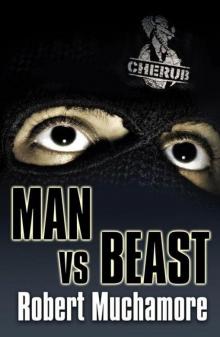 CHERUB: Man vs Beast
CHERUB: Man vs Beast CHERUB: Class A
CHERUB: Class A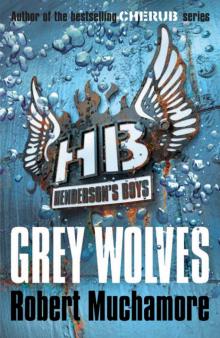 Henderson’s Boys 4: Grey Wolves
Henderson’s Boys 4: Grey Wolves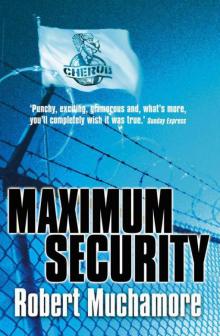 CHERUB: Maximum Security
CHERUB: Maximum Security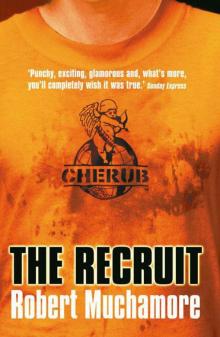 CHERUB: The Recruit
CHERUB: The Recruit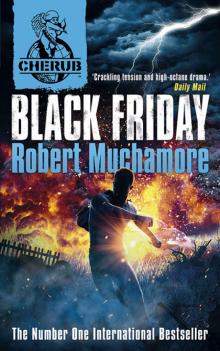 CHERUB: Black Friday
CHERUB: Black Friday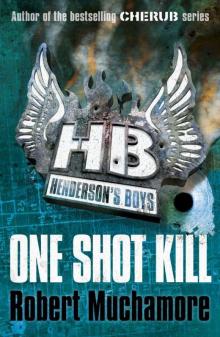 One Shot Kill
One Shot Kill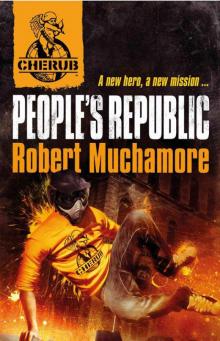 CHERUB: People's Republic
CHERUB: People's Republic